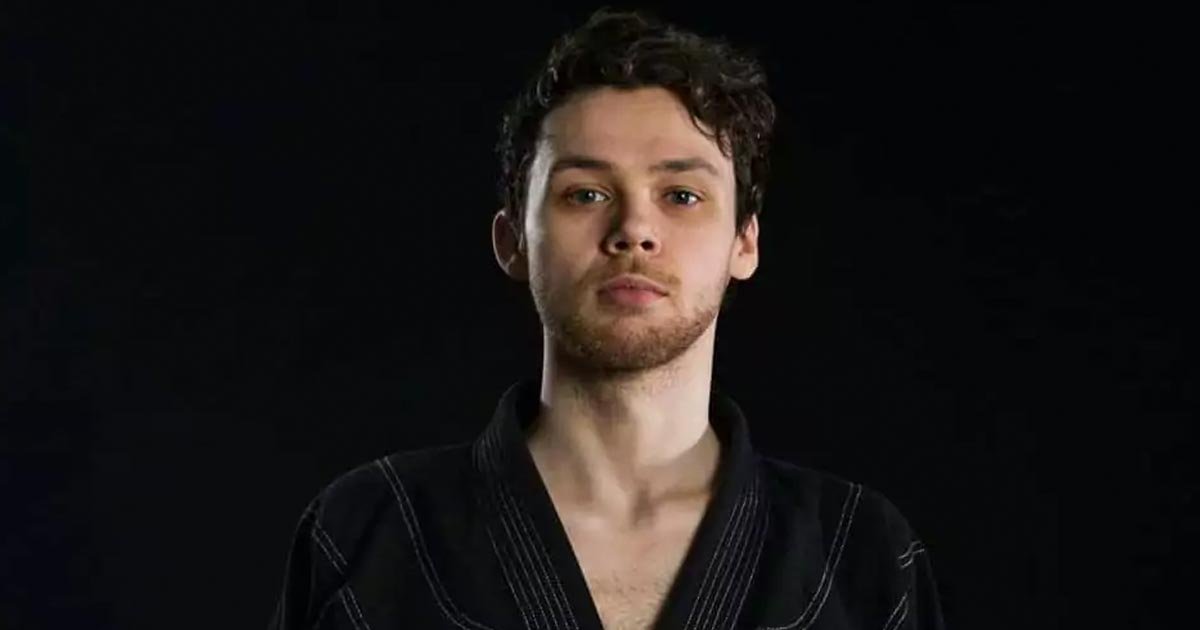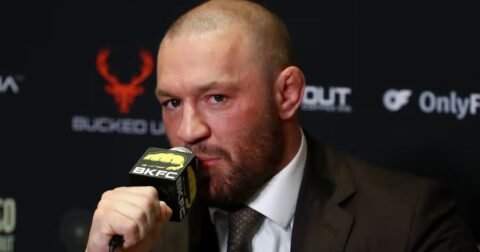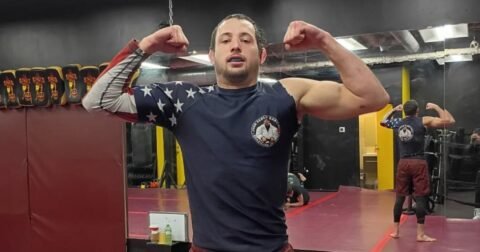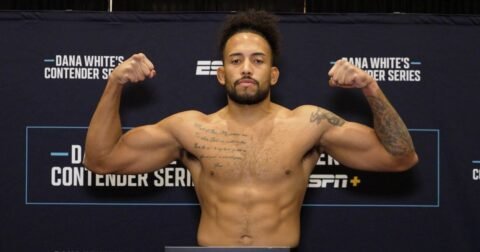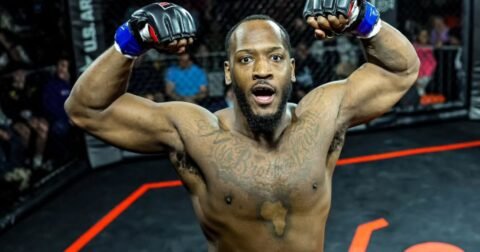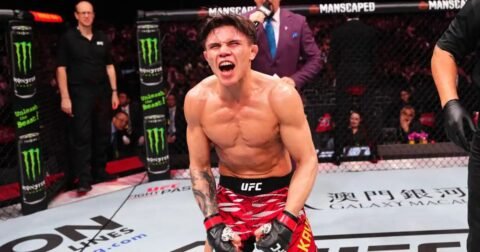I had the pleasure of chatting with Thomas Hepburn who is a brown belt under Rick Young. I sat down with him to talk about his BJJ journey, his time in competitions and if he still plans to fight MMA.
Kieran – Hello Thomas, how are you?
Thomas – Hi Kieran, nice to meet you.
Kieran – So can you tell everyone where your BJJ journey started and what got you into it?
Thomas – I always had a fascination with martial arts and the idea of being able to defend myself was appealing. In my childhood and teenage years, I had a number of altercations that might be described as like, more than usual fistfights? I don’t know how to describe it. Some really dangerous moments that enforced my passion for martial arts. I started at a few different places, but ended up at Rick’s not long after I’d moved. I remember when I first looked him up, prior, I thought he must be fake because there were so many black belts listed that he had. You know, like those guys that give themselves belts? Anyway, I showed up and learned very quickly that it wasn’t like things I had learnt before, it was all effective and practical. I had initially went there to learn kali because I wanted to learn all the cool ways of fighting. Rick is like one of the top instructors in Europe from what I had gathered. Anyway, I came for the kali, stayed for the BJJ. I took to it fairly quickly and really enjoyed the amount you could learn and go home and think about.
Kieran – I think I understand what you mean by more than fistfights, sometimes there were more than fists involved? What kind of places had you been before Rick’s?
Thomas – I don’t want to get into it too much, but I ended up in bad situations that were more than like, adolescent fistfights. I had a fair few of those too though! As a teenager, I really had no fighting ability though, like, even less than other kids. Before Rick’s, I had trained at a local boxing gym, but a prevalent problem in boxing is that you need to look special before you even show up, otherwise nobody pays you any interest. I started at like 16 and at that age, you’re already “too old” to compete seriously. I think though that attitude has begun to really change a lot in the last 10 years. I had also tried a few other places, kung fu classes, the local karate place etc. I even stuck around at a Ninjutsu place for a while, playing with bokken and rubber ninja stars, thinking I was learning something. Then I got into an altercation with someone considerably larger than me and a lot more prone to violence. Quickly I realised that standing wrist locks don’t work the way I was taught and got a fist in the face for my troubles. After that, I turned towards more proven methods. MMA didn’t really appeal to me in the beginning because it was so un-aesthetic and I didn’t really understand what was going on, it just looked like a fistfight, I didn’t realise how much technique went into it. Anyway, once I moved at 20, I was close enough to Rick’s and started taking all the classes offered. I quickly dropped kali and stuck around for kickboxing and BJJ because I could really test the stuff I was doing.
Kieran – No worries mate we don’t need to go into anything further. Can you talk about the first time you got on the mat considering that most of the things you had done previously were predominantly stand up disciplines?
Thomas – First time I ever rolled was in the Ninjutsu class. In retrospect they, and I, had no idea what they were doing, like not even to a judo newaza standard. The first time I went to Rick’s I was actually 18, but I only stuck around for like 2 months. I was constantly asking white belt “what if” questions and generally not being a great student. When I returned at 20, which is what I’d consider to be my true “start” in martial arts, I had learned to just keep my mouth shut. One of the first things I ever remember getting shown was a flower sweep. I laughed out loud because I was so amazed at the change in positions. My preconceptions of fighting changed drastically with that. All of a sudden I realised that this might be different.
Kieran – So you first started BJJ at 20 officially, you are now a brown belt. What else has BJJ taught you apart learning the gentle art?
Thomas – I’d say the biggest thing BJJ taught me is HOW to learn. How to properly trust a learning method or process. It has made me less afraid to learn other things. Singing for instance. I found someone good at teaching it and now I’m trusting in their process to improve me, even if I can’t tell if I’m improving.
Kieran – Sometimes we struggle to put our faith in others for whatever reason, but it’s great that we can trust coaches to help us develop and direct us. Let me tell you, you wouldn’t find me singing, I sound terrible. How has it been learning under someone as established as Rick Young?
Thomas – I’m terrible too, but I have enough faith in the process to at least trust that I’ll improve! Learning under Rick is pretty great. I made lots of friends and had a really good environment for learning in. There’s no drama, no cliques, no ego really. Everyone’s sole purpose there is to learn and improve. There are never any issues. Rick teaches the vast majority of classes, he’s never late, there’s never any turbulence so you’re guaranteed a great and consistent learning experience. It’s not a competition gym – as in, competing is completely optional – it’s designed to be a safe place to learn martial arts and that’s it.
Kieran – It’s great when the place is a safe haven first and then whatever else comes after. So let’s talk about competition, can you remember the first time you competed and what that felt like physically and mentally?
Thomas – Yeah, the very first time I competed I was a white belt. I got smashed like 12-0 and my fingernails were slightly too long and he had forced my fist closed and my nails peeled backwards. That guy ended up winning the gold and I was maybe 6 months into BJJ by then. Lesson learnt. I cut my nails next time. My next competition, about 3 or 4 months later, the first match I got a hip bump sweep and landed into mount. I had the strangest occurrence right at that second I realised I had literally never won a single competitive sporting event in my life. I remember grapevining hard and thinking “Oh my god, I’m actually WINNING at something, this is so weird!” I went on to win gold, submitted everyone with a triangle/armbar combo if I recall correctly. I didn’t want to let that first competition get me down so when I won next time round I was thrilled.
Kieran – That sounds painful. You said you like improving even if you don’t notice it yourself, but with competitions have you noticed yourself improve and is that something you like to do is get better with every competition?
Thomas – Yeah, constantly improving is a big thing for me. I try never to be complacent with my current level because that leads to stagnation. I just want to improve but competition will always improve you faster in a very unique way that’s impossible to replicate. Of course, I definitely feel I’ve improved but as you go up the rankings it gets harder to tell exactly “how”. For instance, I don’t feel as different between the start of my purple belt to now but clearly, I’ve changed and improved a lot. The adjustments become smaller and less obvious. The hardest part is being a good purple belt and losing to black belts because you’re like “we are doing the same thing, so how come I’m always getting tapped and they aren’t?”
Kieran – Yeah, it makes sense to ask such a question. “I train BJJ and so do you, but why do you seem to be winning more?” And perhaps it is because of those small adjustments that you mentioned. Has there ever been a moment in your BJJ journey when you’ve felt stuck or caught up on a specific detail and if so, what advice would you give to someone who may be in that same position?
Thomas – Man, ALL THE TIME! Especially like I said before when you start improving and the adjustments are smaller. I realised as soon as I got my blue belt that I couldn’t pin anybody who was even slightly bigger than me. I would just get rolled because my weight distribution was wrong. I spent like 2 years focusing on that. There’s technical stagnation where you’re stuck on a move and there’s like, mental stagnation where you don’t feel like you’re improving overall. The latter is definitely the harder problem. The only solution of course is to continue to show up and apply meaningful practice and not just mindless practice. What really helped me was switching the wording in my head. I stopped like, giving myself the “option” of skipping training by referring to it in my head as a job. “I’ve got to go to work” rather than “Should I go training tonight”. I know it sounds silly but it REALLY worked. I stopped being lazy about missing sessions and stayed super consistent over long periods that way simply by changing the terminology in my head. I’d say to someone struggling with consistency, that might be a good starting point.
Kieran – It sounds like you almost used reverse psychology on yourself to really improve that. Stuart mentioned that you are very strong for being under 70kg, is that because you spent that time working on your weight distribution?
Thomas – Eh, overall I’m not very strong. I can’t lift much or bench very heavy at all. I guess I have a lot of “grapplers strength?” My core does a lot of the heavy lifting though.
Kieran – Can I get your opinion on a particular submission? Specifically the topside guillotine. We don’t see them very often, why do you think that is when nine times out of ten the person executing the submission gets the finish?
Thomas – Assuming that it’s tight and on correctly around the neck, it’s mostly because the uke can’t get their hips away to relieve pressure. When it’s done from the guard, people can tripod and fight the attacking arm. You can’t tripod away when you’re on your back though.
Kieran – Thank you for that lesson mate.
Thomas – No worries, bit of a specific one that, why were you asking anyway?
Kieran – I’d seen it on SUG and as I say you don’t see them often so thought I’d ask someone with experience in that particular field.
Thomas – Aaaaaah.
Kieran – So you have also done MMA with a good amateur record and you turned pro and won. That was back in 2018, would you like to go back to MMA or is the focus on BJJ?
Thomas – Aye, I have since fought Muay Thai and BJJ. My big focus right now is to make it out to Thailand actually. I’ve made contact with an MMA gym that would be willing to take me on full time. I want to fight in ONE Championship by the end of next year. With a bit of luck and funding, I’ll be out as soon as the borders are open again, visa in hand.
Kieran – I hope all goes well for you mate and you achieve that. So for my last question, we know by the end of next year you would like to be in ONE Championship, but where would you like to be in the next five years with both MMA and BJJ?
Thomas – Proper job application question. In the next five years, as far as I can take myself competitively in MMA, wherever that may be. I’d hope in the next five years I’ll get my black belt. Then after that, I just want to open a gym and teach the next generation. Just deciding on a country to move to open a place.
Kieran – Well, Mr Hepburn, you got the job. Thomas, thank you for chatting with me and telling me all about your journey, and I hope you achieve everything you have planned for your career.
Thomas – Thanks man, that’s very kind of you. I hope MMA UK becomes a multi-million-pound operation and you lot get paid your worth.

